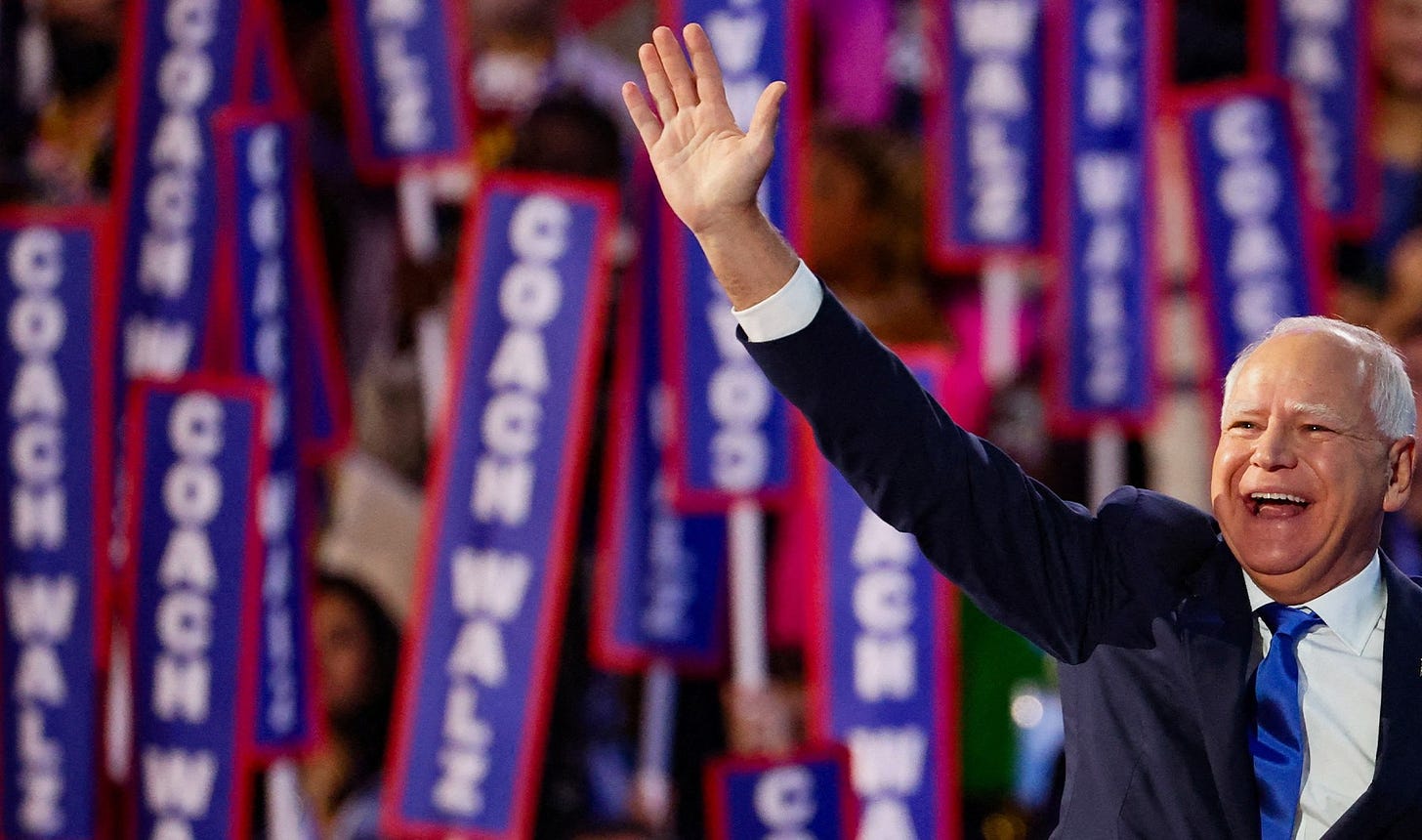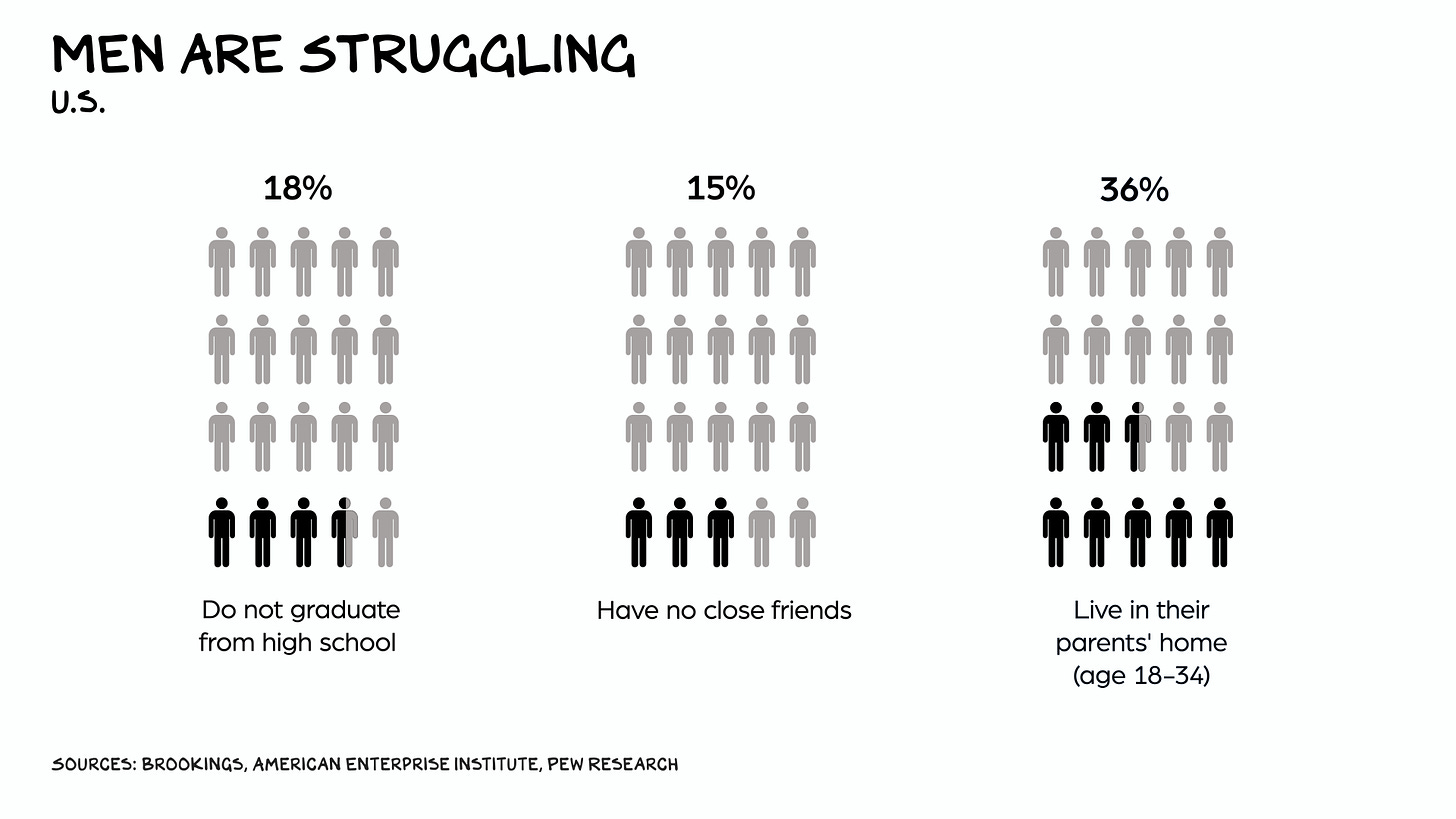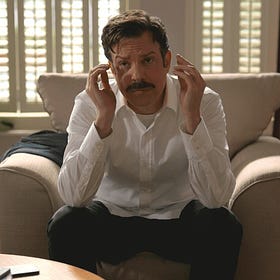The New American Manhood
Now you can be an empathetic, subservient & loving person and still be a man
Welcome to the weekend edition of The Experiment, your official hopepunk newsletter. If you’d like to support my work, become a paid subscriber or check out the options below. But even if you don’t, this bugga free. Thanks for reading!
My work buddy Sean could not believe what he saw. “He just came out and said it!” he said, referring to Tim Walz’s speech to the Democratic National Convention. “I mean, he just said it!” Sean’s default setting is over-caffeinated, but he was more full of electricity than usual, even for him. Everything about him—his eyes, his voice, his hands—seemed overloaded and unable to express his reaction to what Walz had told the delegates in Chicago.
Sean was raised in a military family in rural Louisiana, but he wasn’t reacting to Walz’s flip-flop on guns, his defense of abortion rights, or even that he seemed happily subservient to a bi-racial woman. Sean could not get over what Walz told his wife and children from the podium.
“Hope, Gus and Gwen, you are my entire world and I love you,” said Walz.
“He just said it!” Sean could not get over seeing a man, a father, and a husband express love so easily. “You know how many times my grandfather told me he loved me?” I did not. “Twice! And once was on this death bed.” And that was two more times that his father told him that he loved him.
“He just said it!”
My dad always told me he loved me, even when he doesn’t say it explicitly. I defy you to listen to him call me “kiddo” and tell me he’s not telling me he loves me. But Sean’s onto something. American manhood has been defined by its constrictions: Boys don’t cry. Boys will be boys. Be a man. Man up. Every man for himself. A man’s man. The strong, silent type. Protect, procreate, and provide.
In 2013, Dr. Michael Kimmel, a Distinguished Professor of Sociology at Stony Brook University in New York, gave a lecture “Boys Will Be Boys: Deconstructing Masculinity and Manhood at Dartmouth” in which he laid out “four basic rules of manhood: no sissy stuff—there must be a relentless repudiation of femininity; be a big wheel—bring home the bacon; be a sturdy oak—be reliable in a crisis; give ‘em hell—take risks and do what has to be done.”
American men are going through a bit of a rough patch right now. Credit to podcaster and investor Scott Galloway for waving a flag on this before I was ready to see it.
Boys start school less prepared than girls, and they’re less likely to graduate from high school and attend or graduate from college. One in seven men reports having no friends, and three of every four deaths of despair in America — suicides and drug overdoses — are men.
One in seven men don’t have a single friend? What’re you going to do about it, cry? In my head, I tell myself that reflex is more of a joke than a flex, but the ugliness remains. My factory wiring as a man of a certain age in America is that I have to police the unmanly behaviors of my brethren lest I get judged unmanly, like a Soviet citizen turning in his neighbors to protect himself from suspicion. It’s a subroutine that never stops in my brain, constantly humming in the background, and it’s exhausting.
That’s why Sean’s shock at seeing Walz express love so freely and confidently—so manly, if you will—didn’t surprise me. Walz was demonstrating a new way to be a man. He ended up in a manly place. Most people who are not insane ragemonsters would shrug and admit that, yeah, Tim Walz seems like a strong, confident leader, three words that have traditionally been coded for manhood. But he arrived at this place by cheerfully making himself subservient to a Black lady, and that has never been coded in the American DNA as manly behavior. In fact, articles are written to help men emotionally deal with working for female bosses, and by that I mean of course articles to help female bosses make their male subordinates feel less professionally emasculated.
But Walz, who doesn’t seem to feel emasculated, has shown us a new way of achieving manhood while committing acts that previously would have disqualified him from acceptance as a man. In 1972, Ed Muskie was the Democratic presidential frontrunner until he cried in front of reporters, which admittedly is not ideal media relations. But now, Walz can unashamedly show his deepest emotions in public without losing his man card, and yes, I know that’s an awful way to put it, but it fits. He showed you can act in a way that used to be unmanly and still be considered a real man, which again, ugh, what a horrible term.
Doug Emhoff made a similar case for the new version of American manhood when he told the DNC delegates and millions of television viewers at home that he was an uncool dork without any game whatsoever.
Now for generations, people have debated when to call the person you’re being set up with and never in history has anyone suggested 8:30 AM and yet that’s when I dialed. I got Kamala’s voicemail and I just started rambling. “Hey, it’s Doug. I’m on my way to an early meeting. Again, it’s Doug.” I remember I was trying to grab the words out of the air and just put them back in my mouth. And after what seemed like far too many minutes, I hung up. By the way, Kamala saved that voicemail and she makes me listen to it on every anniversary.
Like Walz, Doug has also made himself subservient to a bi-racial woman, and I’m not just referring to the ritual and seemingly loving humiliation of having to sit through that voice mail every year. Emhoff was an incredibly successful lawyer with money, prestige, and the respect of his peers—and he gave it all up to support his wife’s career and to occupy a role entirely new in American history: the Second Gentleman. And like Walz, this did not disqualify him from manhood as it surely would have done not too long ago. Instead of emasculating him, Emhoff comes across as super confident, i.e., manly AF.
Once you look for avatars of this new American manhood, you see them everywhere, from leading man Glen Powell, who is known for his kindness as much as his charisma, to John Cena, the former wrestler who has made a movie career out of playing foolish, mockable characters and in doing so, demonstrating his supreme confidence. And, of course, there’s podcaster Galloway, who leavens his penis jokes on The Pivot, his podcast with Kara Swisher, with authentic emotional vulnerability, frequent tears, and admissions that he often gets things wrong. And don’t get me started on Ted Lasso.
Emhoff comes across as super confident, i.e., manly AF.
I’ll admit here that I’ve identified five examples from a specific slice of men: white, wealthy, famous, and heterosexual. I’m not qualified to dive into the kinds of toxic masculinity that devil men of other ethnicities, races, sexual orientations, and gender roles, and I’m speaking here without any academic training in gender roles or sociology whatsoever, so I’ll cede the point that there’s a lot more to this than I can possibly understand. And, of course, there are a lot of jackwagons out there who still use “fag” to insult a man they deem unmanly.
But what I’m seeing is encouraging. Something has turned. Behaviors that used to get men excluded from being considered men no longer pose danger in our society at large. A man can cry, profess love, put his career aside, treat coworkers with kindness, act a fool, and wrestle with feelings in public and not be exiled from manhood. Now, a fella can act like a completely normal person and not some plastic action figure and still be a man. My goodness, a man can even tell his family that he loves them, out in public in front of the whole world, and he’s still a man. God bless America.
Jason Stanford is a co-author of NYT-best selling Forget the Alamo: The Rise and Fall of an American Myth. His bylines have appeared in the Washington Post, Time, and Texas Monthly, among others. Follow him on Threads at @jasonstanford, or email him at jason31170@gmail.com.
Further Reading
Manhood
The real reason Ted Lasso freaked out.
We set up a merch table in the back where you can get T-shirts, coffee mugs, and even tote bags now. Show the world that you’re part of The Experiment.
We’ve also got a tip jar, and I promise to waste every cent you give me on having fun, because writing this newsletter for you is how I have fun.
Buy the book Texas Lt. Gov. Dan Patrick banned from the Bullock Texas History Museum: Forget the Alamo: The Rise and Fall of the American Myth by Bryan Burrough, Chris Tomlinson, and myself is out from Penguin Random House. The New York Times bestseller is out in paperback now!











Great piece, Jason. Thanks.
on this theme, you should read For the Love of Men by Liz Plank, a forceful case for feminism bc it serves men and boys